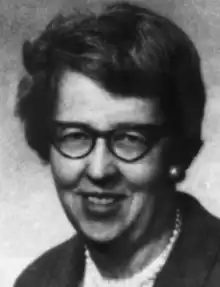Elizabeth Ann Brown
Elizabeth Ann Brown (August 15, 1918 – March 7, 2017) was an American foreign service officer. She was appointed Director of the Office of United Nations Political Affairs in 1965, and won the Federal Woman's Award in 1967.
Elizabeth Ann Brown | |
|---|---|
 Elizabeth Ann Brown, from a 1967 publication of the US Department of State | |
| Born | August 15, 1918 Portland, Oregon |
| Died | March 7, 2017 (aged 98) Washington, D.C. |
| Occupation | Foreign service officer |
Early life and education
Elizabeth Ann Brown was born in Portland, Oregon, the daughter of Edwin Keith Brown and Grace Viola Foss Brown.[1][2] She earned a bachelor's degree in political science from Reed College in 1940,[3] with a senior thesis titled "A Study of Isolationist Propaganda".[4] She earned a master's degree in international relations and government from Columbia University in 1943.[5][6]
Career
During World War II, Brown worked for the National War Labor Board. After the war, she joined the State Department, where she was a foreign affairs analyst and officer. In 1956 she became acting Officer in Charge of the Office of United Nations Political Affairs. From 1960 to 1963, she worked at the American Embassy in Bonn.[7] She was named Director of the Office of United Nations Political Affairs in 1965, and won the Federal Woman's Award in 1967,[5] "for her unique accomplishments in the precedent-building field of multilateral diplomacy".[6][8] In 1968, she was a keynote speaker at the Model United Nations of the Far West, held at the University of Arizona.[9]
From 1970 to 1975, Brown was Political Counselor at the Embassy of the United States in Athens. She was Deputy Chief of Mission at The Hague in 1975. She spent the last years of her career working in Washington, D.C., and retired in 1979.[3]
Brown wrote a college history, The Formative Years of Reed College (1947),[10] served on the National Advisory Council of Reed College, and won the school's Distinguished Service Award in 1992.[3]
Personal life and legacy
Brown gave an oral history interview to the Association for Diplomatic Studies and Training in 1995.[11] She died in 2017, aged 98 years, in Washington, D.C.[1]
References
- "Elizabeth Brown" Washington Post (March 15, 2017); via Legacy
- Langworthy, William Franklin (1940). The Langworthy family; some descendants of Andrew and Rachel (Hubbard) Langworthy who were married at Newport, Rhode Island, November 3, 1658. Hamilton, N.Y.: W.F. and O.S. Langworthy. p. 292 – via Hathi Trust.
- "Elizabeth Ann Brown '40". Reed Magazine | In Memoriam. Retrieved 2022-01-28.
- Brown, Elizabeth Ann (1940). A Study of Isolationist Propaganda.
- "Elizabeth Ann Brown to Receive Federal Woman's Award" Department of State News Letter (February 1967): 31. via Internet Archive
- Central Intelligence Agency (1967-02-07). 1967 Federal Woman's Award. Emma Best. p. 2 – via Internet Archive.
- "The 54th Anniversary of the Berlin Wall". HuffPost. 2015-08-13. Retrieved 2022-01-28.
- Johnson, Lyndon B. (March 7, 1967). "Remarks at the Seventh Annual Federal Woman's Award Ceremony". The American Presidency Project. Retrieved 2022-01-28.
- "Archives". MUNFW. 2020-08-11. Retrieved 2022-01-28.
- Brown, Elizabeth Ann (1947). The Formative Years of Reed College. Reed College.
- Dunnigan, Thomas J. (May 1995). "Oral history interview with Elizabeth Ann Brown" Association for Diplomatic Studies and Training Foreign Affairs Oral History Project.
External links
- Elizabeth Ann Brown, "Fourth Regular Session of the General Assembly" The Department of State Bulletin 22 (January 2, 1950): 3–15.
- Elizabeth Ann Brown, "Fifth Regular Session of the General Assembly" The Department of State Bulletin 23 (January 22, 1951): 138–152.
- Elizabeth Ann Brown, "Survey of Membership Problem" (1955), a report about the United Nations